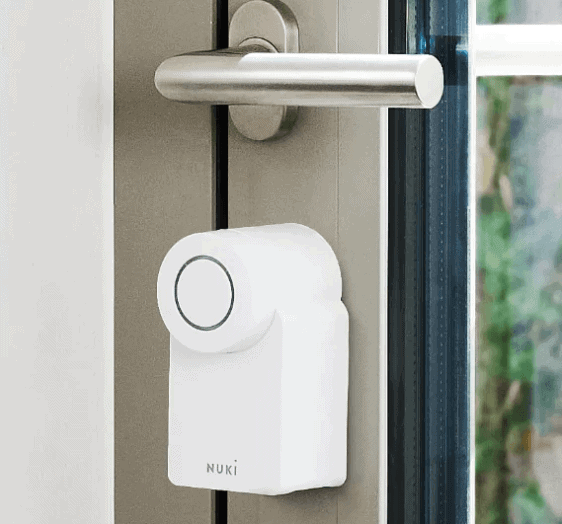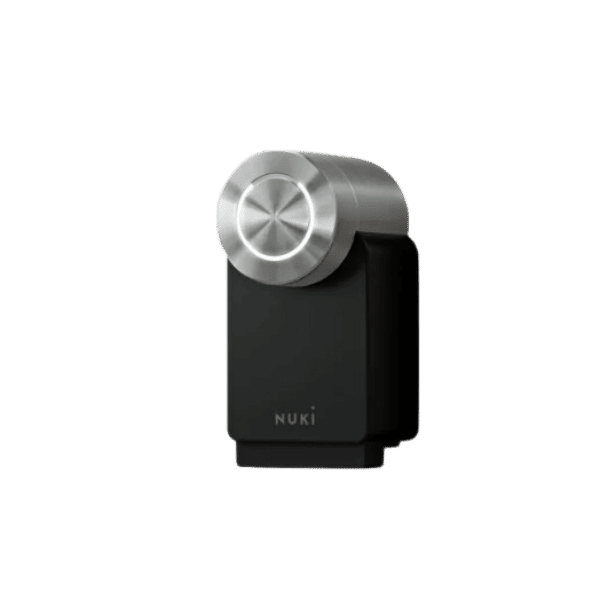AI Messaging Audit
For hosts using Guesty, Hostaway, Lodgify, BookingSync, or Hostify, discover hidden opportunities in your guest messages with AI!
Improve your check-in process and enhance security by adopting keyless self-check-in with smart locks. However, with the abundance of options available, choosing the right locks can be a daunting task.
At Enso Connect, we specialize in empowering property owners and managers with smart connected systems, including keyless entry. That’s why we have conducted a comprehensive evaluation of one of the most popular smart lock lines in the market: the Nuki locks.
By the end of this review, you will gain insight into:
Search the list of Nuki lock models live in our system to see if you can add them to your Enso Connect dashboard
Elevate security and convenience by embracing smart locks that seamlessly integrate with your property management system (PMS) and smart devices via Enso Connect. These innovative locks offer guest-specific access codes, valid only during their stay, ensuring restricted access outside designated periods. Additionally, you can effortlessly control the locks remotely, eliminating concerns about guests forgetting to secure the door.
The Nuki family of smart locks is a perfect match for these requirements, boasting compatibility with both deadbolts and levers, making them suitable for nearly all standard doors in North America.
Enso Connect simplifies the guest experience by delivering entry codes in advance through its user-friendly Boarding Pass system, which can be customized to align with your branding. This enables guests to access the property immediately upon arrival. The Boarding Pass functionality also empowers you to share guidebooks, generate additional revenue through late check-in and check-out options, and offer personalized upsells to enhance guest satisfaction.
Modernize your check-in process to ensure a seamless and delightful experience for your guests.

While Enso Connect is compatible with the mentioned door locks, we highly recommend contacting our team to confirm the connectivity of your specific lock model with Enso. Our dedicated team will provide the necessary assistance to ensure seamless integration and optimal functionality.
Let’s take a look at why, and what we recommend:
Opting for a lock with a long battery life is crucial for several reasons. First and foremost, it ensures uninterrupted operation and reliable security. A lock with extended battery life reduces the risk of unexpected lockouts due to drained batteries, preventing inconveniences and potential security vulnerabilities. Additionally, a lock with a long-lasting battery reduces the frequency and cost of battery replacements, saving both time and money in the long run.
We generally recommend locks with push buttons over touch screens for several reasons.
Firstly, push buttons tend to be more durable and resistant to wear and tear compared to touch screens. Touch screens are susceptible to scratches, smudges, and potential damage from external factors, which may affect their functionality over time.
Push-button locks are often easier to use, especially in situations where individuals may have limited dexterity or impaired vision. The tactile feedback provided by push buttons allows users to confidently enter access codes without relying solely on visual cues.
Having a lock with a key override feature is advantageous for several reasons. First and foremost, it provides a reliable backup method of entry in case of emergencies or technical malfunctions. If there are any issues with the electronic components or power supply of the lock, the key override ensures that authorized individuals can still access the property without relying solely on the electronic functionality.
Installing Nuki smart locks is a breeze. With just a screwdriver, you can effortlessly install most Nuki locks, particularly when retrofitting them into existing holes in the door frame. Check out this informative video to learn more about the Nuki Lock.
Determining whether the Nuki smart lock is worth it depends on your specific needs, preferences, and priorities, but at Enso Connect we believe Nuki locks are an excellent option for hospitality operators.

Nuki locks can operate without the need for a constant Wi-Fi connection. Nuki smart locks primarily rely on Bluetooth technology for communication between the lock and your smartphone or other connected devices. This means that you can control and operate the lock within Bluetooth range, typically within a few meters.
However, to enjoy remote access and additional smart features, such as controlling the lock from anywhere or receiving notifications, a Wi-Fi bridge is required. The Nuki Bridge connects to your home’s Wi-Fi network and acts as a bridge between your Nuki lock and the Nuki app on your smartphone. With the Nuki Bridge, you can access and control your Nuki lock remotely, even when you’re away from home.
It’s important to note that while a Wi-Fi connection is not mandatory for basic functionality, it greatly expands the capabilities and convenience of Nuki locks. If remote access and smart features are important to you, adding a Nuki Bridge and connecting it to your Wi-Fi network is recommended.
Nuki locks prioritize safety and security, incorporating several measures to protect your property. Here are some factors that contribute to the safety and security of Nuki locks:
On average, Nuki locks can operate on a set of standard batteries (e.g., AA or AAA) for several months before requiring replacement.
The estimated battery life for Nuki locks typically ranges from 6 to 12 months, but it can be shorter or longer depending on usage.
It’s important to note that frequent use of the lock, the number of lock/unlock cycles, and the frequency of remote operations via the Nuki app or Bridge can impact battery consumption. Additionally, the battery life can be affected by environmental conditions, such as extreme temperatures.
Nuki provides battery status indicators through the Nuki app, allowing you to monitor the battery level and receive notifications when it’s time to replace the batteries. Regularly checking the battery status and having spare batteries on hand can help ensure uninterrupted operation of your Nuki lock.
While Nuki locks incorporate security measures to protect against unauthorized access, it’s important to acknowledge that no system is entirely immune to potential hacking or security risks. To help maintain the security of your Nuki lock, it’s crucial to follow best practices for securing your smart devices:
In the unlikely event that a Nuki lock experiences a failure and guests are unable to check in, it’s important to have contingency plans in place to ensure a smooth guest experience. Here are some steps you can take:
RESOURCES
© 2024 Enso Connect. All Rights Reserved.